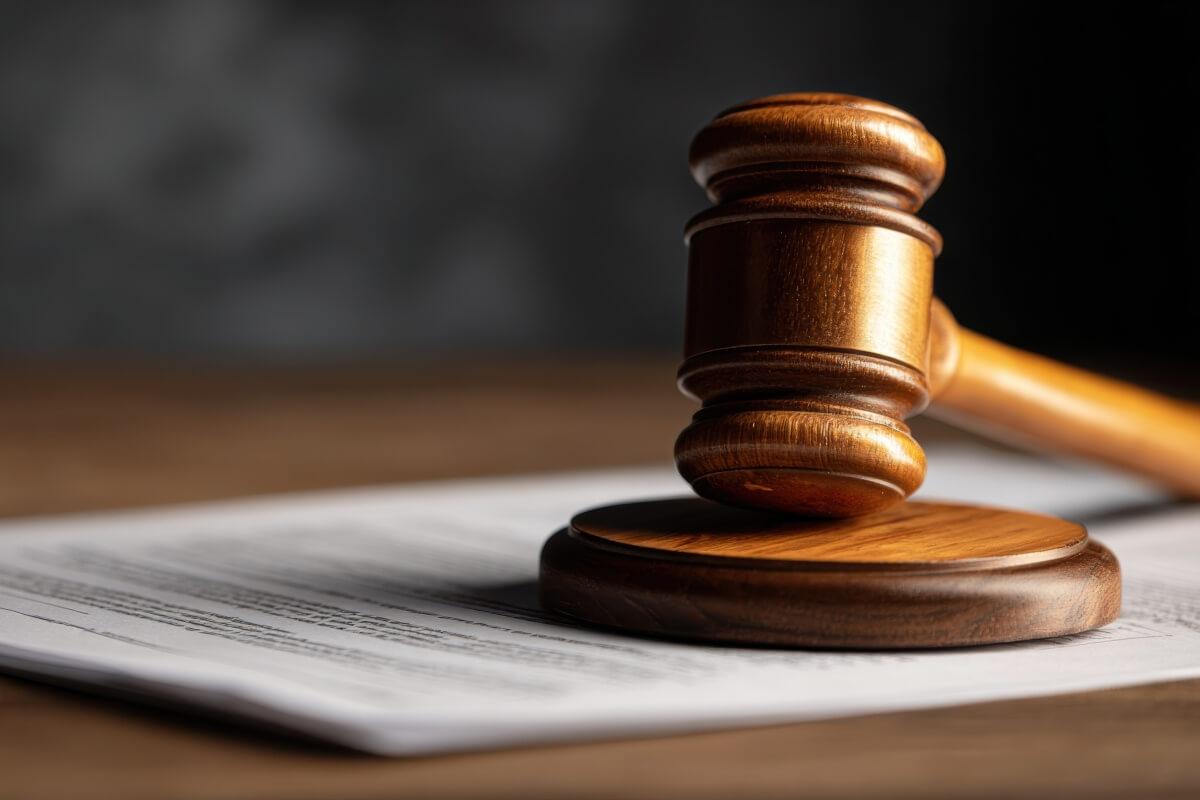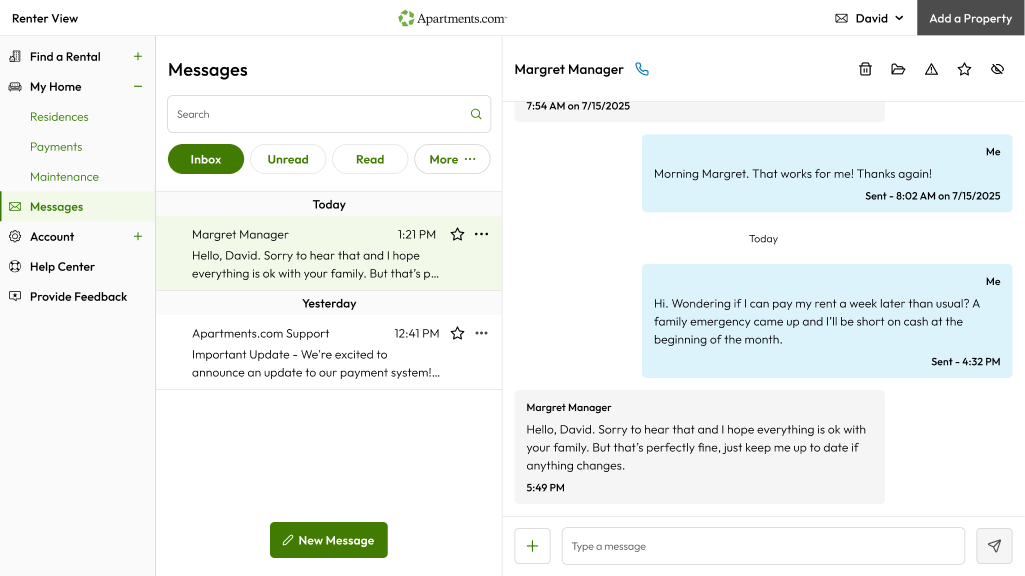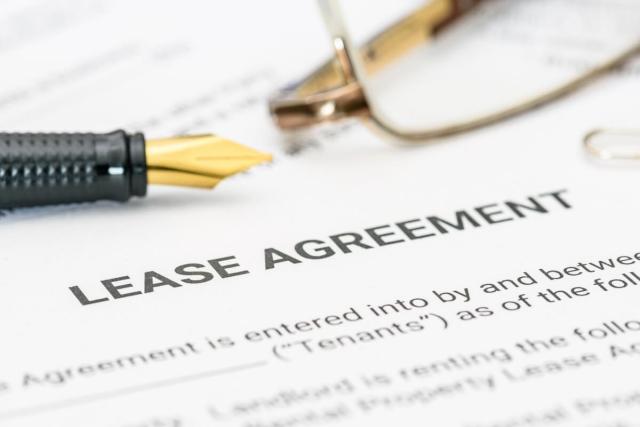Whether you rent from a private landlord or you live in a large apartment community, there are plenty of situations that could lead to a strained relationship with your landlord.
Here are some tips for preventing tension with your landlord and maintaining a good relationship when conflict arises.
Read the Lease
Make sure you read a lease thoroughly before you sign it and keep a copy accessible so you can reference it easily. Many common landlord-tenant disputes can be managed or avoided entirely by knowing the terms of the lease.
Here are some key lease terms and policies you should know:
- When is rent due?
- What’s the pet policy?
- What’s the policy for overnight guests?
- When are quiet hours?
- How much renters insurance coverage do you need?
- How many days’ notice do you have to give in a notice to vacate letter?
Understand the fine print
In addition to the major policies, make sure you read the more nitty-gritty policies. How much are late fees if you miss the rent due date? What are the consequences of breaking your lease early? Knowing these policies before you sign a lease can keep you from being blindsided.
Keep Records
Keep records of everything—rent payments, maintenance requests, and any communications with your landlord. Download payment receipts, save timestamped conversations with your landlord, and communicate all important matters in writing.
Request repairs in writing
Be sure to do a walk-through before moving in and take photos of any existing damage in the apartment. Take photos of any necessary repairs or maintenance and send them to the property manager with detailed notes on what needs attention.
Once you move in, request all repairs and maintenance in writing. If your landlord doesn’t have an online maintenance request portal, send maintenance requests via email or text message. This way, you have a record of the maintenance request and a timestamp of the date and time it was requested.
This is especially important if your landlord ignores your maintenance requests. If your landlord tries to hold you financially responsible for damages due to neglected maintenance, you’ll have proof you requested that maintenance.
Pay Rent on Time
The best way to get along with any landlord is to pay your rent on time. Create calendar reminders on your phone or set up automatic payments to make sure you never miss the rent due date.
Communicate Respectfully
Treat your relationship with your landlord as you would a work relationship. If you find yourself with repeat maintenance issues or having to show your payment receipts each month, don’t raise your voice or make inappropriate comments. Creating tension with your landlord won’t help the situation.
Even if you plan to move after your lease ends, it’s important that you don’t damage your relationship with your landlord. Not only will causing tension make the rest of your lease awkward, but navigating conflict respectfully might land you another landlord reference for the future.
Find a middle ground
If you do find yourself at odds with your landlord, try to find a compromise. Find time to talk face-to-face about the problem and consider your landlord’s concerns. Being willing to meet your landlord halfway is a much more effective approach than anger.
Seek Mediation
In some cases, you may need a third party to help you work through issues with your landlord. Familiarize yourself with local tenant advocacy groups and tenant-landlord mediation services. Bringing in a third party to help resolve conflict can keep issues from heading to court.
Know Your Rights

Knowing your rights on the federal, state, and local levels can help you advocate for yourself. Here are some key laws to know.
Fair Housing Act
The Fair Housing Act (FHA) is a federal law that prohibits landlords from discriminating against renters based on race, color, religion, sex, nationality, familial status, or disability. Landlords cannot show preference for specific classes in their rental advertisements, accept or decline rental applications based on these characteristics, or impose different terms and conditions for certain tenants based on protected classes.
Implied rights
Renters have two implied rights: the implied warranty of habitability and the implied warranty of quiet enjoyment.
Quiet enjoyment refers to the guarantee that renters have to enjoy all parts of their rental without being disturbed without proper warning. For example, a landlord cannot enter a rental without notice unless it’s an emergency, nor can they do construction without observing time restrictions.Habitability refers to the requirement of landlords to maintain a property in safe conditions. For example, landlords are required to address mold, pest infestations, and plumbing problems to maintain habitable conditions. In most states, heating is required for a unit to be considered habitable, but A/C is not.
These “implied” rights mean that even though there are no specific laws or lease clauses that require landlords to provide habitable and private living conditions, tenants are still entitled to those rights by nature of the landlord-tenant relationship.
State laws
It’s a good idea to know what the laws are in your state so you are aware of what is and isn’t allowed in a lease agreement, both from the landlord’s perspective and as a renter.
Here are some common rental laws that vary by state:
- Security deposit maximums
- Permitted uses of a security deposit
- Length of rent grace periods
- Amount of notice required to terminate a lease
- How non-optional fees are advertised (fee transparency laws)
State-level fee transparency laws
So far, Colorado, Connecticut, Massachusetts, Minnesota, Nevada, and Virginia have already passed price transparency laws that require landlords to disclose a rental’s total price in listings.
Apartments.com has implemented an all-in pricing structure that allows property managers across the U.S. to specify whether their listed rent price includes all required monthly fees. When you search for a rental on Apartments.com, the price you see on a listing with a “Total Monthly Price” badge is the price you’ll pay. In the six states where price transparency laws are in effect, listings will either have a “Total Monthly Price” badge, or they’ll have “Plus Fees” written below pricing information on the search results page.
Communicate Directly with Landlords on Apartments.com

Apartments.com has made it easier and safer to communicate with your landlord. Our new Messages platform allows you to chat directly with your landlord without using your personal mobile number or email.
Timestamped messages help you keep a record of communications, and favoriting conversations will make them easier to find later. Make sure you archive important conversations with your landlord, otherwise they’ll auto-delete after 90 days.
Your landlord wants a successful relationship as much as you do. If you respect the property, pay your rent on time, and follow the terms of your lease, you and your landlord should be able to work through any difficult situations that arise.
This article was originally published on March 18, 2019, by Alecia Pirulis.
FAQs
What if my landlord refuses to make essential repairs?
If your landlord refuses to address critical issues like leaks, pest infestations, unsafe electrical or plumbing, or HVAC system malfunction, document the issue in writing and report a code violation to your local housing code department.
Can a landlord evict me for reporting code violations?
No, a landlord cannot legally evict a tenant for reporting code violations. This is considered retaliatory eviction and can be used as a defense in eviction court. Make sure you have proof of when you requested repairs, when you reported the code violation, and when your landlord served you eviction papers. Proving that your landlord decided to evict you shortly after you reported a code violation can help a court rule in your favor.
Do I have to pay rent if the landlord doesn’t fix major issues?
Yes, you must pay rent even if your landlord doesn’t make repairs. Refusing to pay rent is illegal and gives your landlord cause to evict you.
However, some states allow tenants to withhold rent payments in serious cases of habitability issues like lack of heat in the middle of winter, non-functioning plumbing or electricity, or severe structural issues like a collapsing ceiling.
Before you decide to withhold rent payments, check your state laws around rent withholding to avoid giving your landlord cause to pursue eviction.
What documentation should I keep as a renter?
In addition to your lease agreement, keep the following records throughout your lease term:
- Photos of existing damage from your move-in inspection
- Maintenance requests and whether they were addressed properly
- Rent payment receipts
- Communications with your landlord, especially regarding payments and maintenance
When should I consider legal action?
In some cases, you’re well within your right to break your lease or pursue legal action against your landlord. Here are a few scenarios that warrant legal action against your landlord:
- Illegal or retaliatory eviction
- Refusal to address serious issues like lack of heat, plumbing problems, or pest infestations
- Harassment
- Personal injury due to landlord negligence
- Wrongful withholding of a security deposit
Consult your state laws and a landlord-tenant attorney before pursuing legal action, and make sure you have kept all relevant records.






